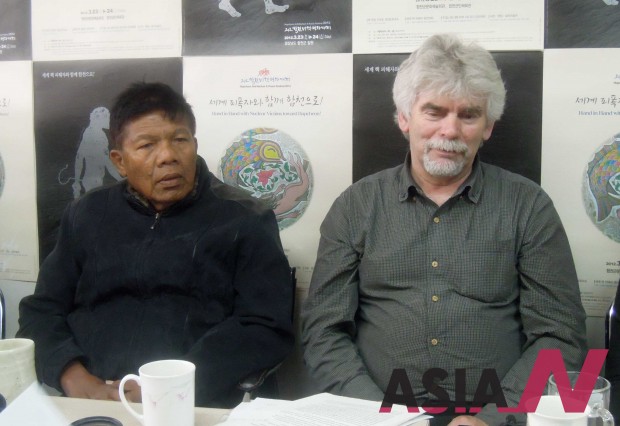Two victims outcry danger of nuclear power plant

Johnny Johnson from Bikini Atolls, left, and Pavel Vdovihenko from Russia pose for camera in the press conference during the Anti-Nuclear & Peace Festival 2012 held in Hapcheon on March 23-24.
HAPCHON, Korea – “There is no perfect safety as far as nuclear program is concerned. A land once devastated by nuclear pollution will never be restored to the state it used to be,” outcried two victims of nuclear fallout who visited Korea on the occasion of the Anti-Nuclear and Peace Festival held in Hapchon, about 300 km south of Seoul, on March 23~24.
They are Pavel Vdovihenko from Russia, 60, a victim of Chernobyl power plant explosion, and Johnny Johnson from Bikini Atolls, 66, affected by the U.S.-conducted nuclear bomb tests on the island.
Throughout the event, the two raised their voices opposing to the construction of nuclear power plants, saying that “who would have ever expected the disaster in Fukushima, Japan, armed with top-notch nuclear technology. All existing nuclear power plants should be closed. They are horrible in that once exploded, there is no remedy at all.”
Korean people’s awareness on the danger of the nuclear material has been greatly enhanced after the explosion of the Fukushima nuclear power plant in Japan last year. The just-ended anti-nuclear event came to be held in reflection of the fact that there is a growing number of people who are concerend about any possible damage from the nuclear power plants here.
People of Korea which relies some 30 percent of its total eletricity production on nuclear power plants, have been relatively lenient in the government move to increase the number of nuclear plants. They paid little attention to the possible disaster the nuclear power plants can bring about. However, the attitude seems to have been changing after the Fukushima disaster.
Vdovihenko said “25 years have passed since the explosion in Chernobyl. But the disasterous situations in the region have remained unchanged. Most of the land within the radius of about 150 km around Chernobyl still remains heavily polluted by a considerable amount of radioactive.”
Furthermore, most the residents in the region rely on woods and logs for fuel due to lack of gas supply. That’s why many of them are also suffering from indirect radioactive pollution from the woods, he futher said.
“Now, I am living in a small town called Novozybkov having some 40,000 population. The ratio of cancer outbreak to total residents is far higher than that of other area. We have as many as 194 new cancer patients a year,” he said.
Johnson also explained about the sufferings of the people on the Bikini Island as a result of the U.S. atomic bomb test from 1946. All the residents in the island were forcibly relocated to nearby island after the test. But, they were permitted to return home in 1968 upon hearing the government announcement that the island was no longer dangerous, he said.
“However, it didn’t take long time to find that they had been exposed to radioactive at a dangerous level. They were told to leave their home again. But, it was too late. Many of them were found suffering from the various kind of cancer,” he went on to say.
The U.S. military conducted a total of 67 nuclear bomb tests on the Bikini and nearby islands from July 1946 through 1958. “Since the end of the test, 54 years have passed. But our paradise is still left uninhabited because of high radioactive pollution,” he said.
Kim Nam-ju david9303@theasian.asia
























































